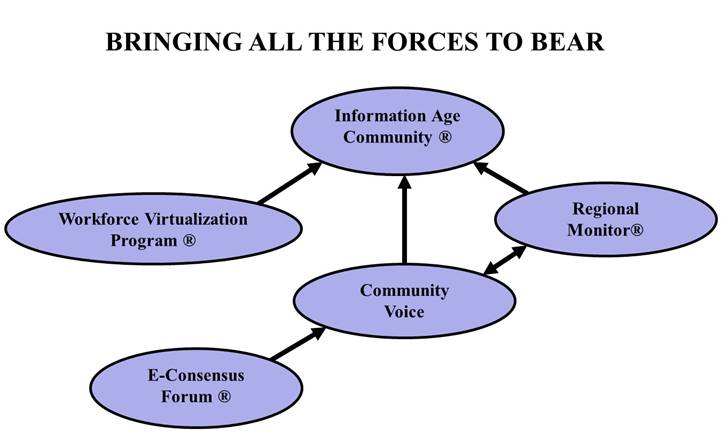Community is not created through
the simple aggregation of its parts, but rather,
Community is created through their integration.
John Sanger
“Slaying the Status Quo”
The powerful forces of the industrial Age centralized society as the assembly line’s demand for workers depopulated rural communities. After almost 200 years, an equal and opposing force has emerged with the decentralizing capabilities of telecommunication technologies. When coupled with community-based policies and other supporting elements, the Information Age Community® has the potential to fully integrate the rural and urban economies.


Col. Elwyn Kropuenske was the commanding officer at Fort Ripley. He became the Chair of the CommTech nonprofit that TCR assisted in forming.
An inquiry with the Dept of Commerce seeking grants in support of community viability resulted in a referral to a database of over 400 grants. Speaking generally, all of these grants were provided by a single agency silo. While all are helpful to their individual missions, the reality is that a new library, water treatment plant, solar panels etc. will have little to no effect on enhancing long term viability nor will they address the broader forces that are reducing the viability of all communities. In looking at the private side, the Lilly Family School of Philanthropy categorizes national giving totaling $557.16 billion in 2023. Similarly, each of these categories provides needed assistance to their specific area of interest but again, acting independently, these grants will support ongoing programs but have little to no effect on enhancing viability nor will they address the broader forces that are reducing that very viability for all similar communities.
There is a reason big problems remain unsolved. Just as the narrow approach of the ad hoc telework failed in the pandemic, so too has the non-integrated approach failed to resolve to reverse the decline. What is needed is a comprehensive, integrated approach. And the government’s private telecommunications system, which took the schools, hospitals, libraries and government offices out of the local market and reduced the market demand by 50% or more in many small towns, has not helped.

There is a reason big problems remain unsolved. Aristotle said “The whole is greater than the sum of its parts” signifying the whole entity possesses qualities that emerge beyond the sum of its individual parts. The corollary should also be true: the needs of the whole are greater than the needs of its parts. We need to focus on the whole!
offers over 400 grants from a variety of sources- all silos. While all are helpful for their individual missions, the reality is that a new library, water treatment plant, solar panels etc. while they may help maintain the status quo, they will have little to no effect on enhancing long-term viability nor will they address the broader forces that are reducing the viability of all communities.
categorizes national donations of $557.16 billion in 2023 as depicted in the attached table. Note that each of these categories provides needed assistance for their specific area of interest but again, acting independently, these grants will support the status quo of ongoing programs but have little to no effect on enhancing long-term viability.
must define what it really needs to increase viability and to use their voice so that the foundations and agencies will fund what they need rather than trying to fit the community’s needs into their silo-based priorities.
the IAC Provides Three, Integrated, Components to achieve this!
The e-Consensus Forum® is a multi-functional policy development tool that eliminates conflict while generating consensus in a variety of venues- with accountability. It promotes implementation accountability through its Community Voice.
which incorporates facility right-sizing, virtualized Continuity of Operations deployment, the regional Vulnerability Audit, and regional statistical capabilities for policy and operational analysis and forecasts. TCR's Deployment partnership program supports Metropolitan Planning Organizations in congestion relief, emergency management of infrastructure forecasts, etc.
supports the Community in reaching parity with the Public and Private sectors. It incorporates the Regional Monitor ® which provides the informational structure that powers the IAC implementation. The IAC's Assessment Module provides a series of tools to support virtualization of a variety of markets/verticals.
Send a Message
Phone Number
Jfsanger@telecommuter.org
4315 Virginia Avenue St Paul, MN 55126
The Information Age Community incorporates AI in many of its tools and strategies. It truly allows society to embrace the many benefits of the Information Age and the Freedom of Residential Choice that it provides. All six community types are affected by this reversal of the 200 year Industrial Age mindset and each must build upon the benefits of the old even as they adopt the new opportunities.
©All rights reserved,2025 Tele-Commuter Resources,Inc. Design and development by VibgyorWeb Technologies.